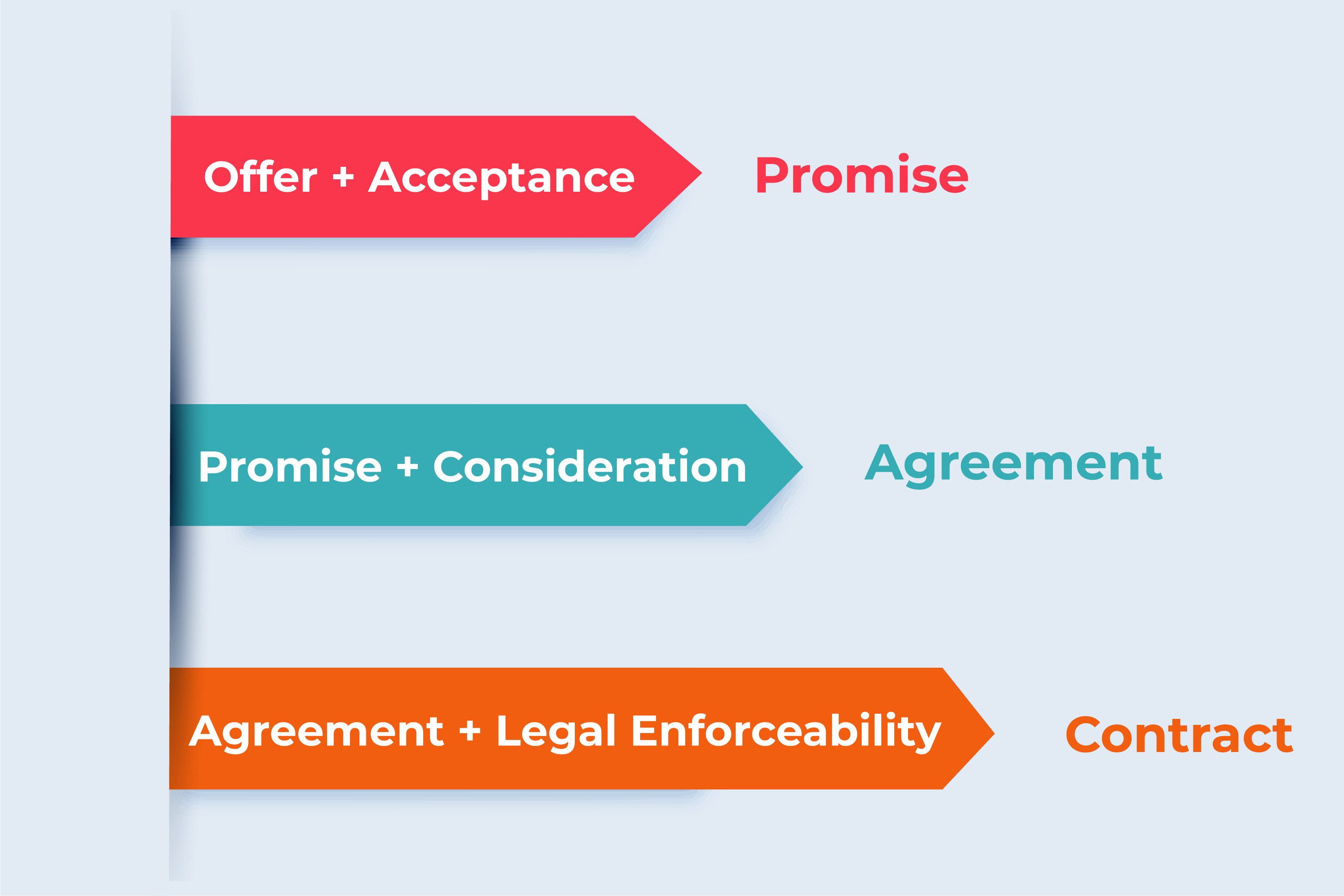Difference Between Agreement And Contract In India
Posted On : May 9, 2022

Table of Contents
All squares are rectangles but all rectangles are not squares!! Now that was an easy high school fact which people good at Mathematics can grasp. For law students, the context switches the main terms used here. It turns to “All Contracts are agreements But all agreements are not contracts”. But aren’t these two terms one and the same thing? Know the difference between agreement and contract with the explanations below.
Law of Contract in India
The legislature enacted the Indian Contract Act in 1872. However, various amendments have been brought in the same since it was enacted two centuries back to fulfill the needs that arose with time. The law mainly governs the very basic needs of a society, i.e. contracts. People often misunderstand a contract with what has been reduced to writing and has been signed by the parties concerned. In day-to-day lives, we all make contracts, whether we are at the grocery shop or a supermarket, accepting a job offer letter or renting out a property. One may resort to a civil lawyer in Kolkata for property related contracts in Kolkata before signing one. Understanding the basics of a contract is a must. Consultation with contract lawyers in India can save them from any unexpected trouble.
What is an Agreement in Contract Law?
Where there is an offer made by one person and is accepted by another, it is a promise. As per the Section 2 (e) of the Indian Contract Act, where there is a promise between two parties involving a certain consideration, it is an agreement. The most important part is that as per the Section 2 (h) of the same Act, when an agreement is legally enforceable, it becomes a contract. Thus, the key difference between contract and mere agreement is that an agreement in compliance with the applicable laws is a contract. However, an agreement that lacks compliance with the requisite legal conditions, it remains an agreement which is not enforceable in the court of law.

Essentials of a Contract
- Offer and Acceptance
- Mutual consent
- Free consent
- Consideration
- Competent Parties
- Legal Purpose
The difference between agreement and contract can be depicted through the above essentials of a valid contract whereby offer, acceptance and mutual consent sum up what we call an agreement. However, all the additional pointers altogether in this regard make up a contract. When one of these elements is missing, it is no more a legally enforceable contract but a mere agreement. In case of confusion involving some financial interests in Kolkata, a lawyer in Kolkata may help.
Void Agreements
- Agreement in restraint of marriage[1] - If an agreement restricts someone from marrying another or even a particular person, it is void from the very beginning (void ab initio). Thus, even if there is due process followed from offer to acceptance and consideration, if it regards to restraining someone from right to marry, it is not lawfully enforceable and thus, not a contract.
- Agreement in restraint of trade[2] - Right to trade or business is a fundamental right[3] as per the Article 19 (1) (g) of the Constitution. If an agreement forces another not to engage in trade, even if in return of a consideration, it is void and thus ineffective.
- Agreement in restraint of legal proceedings[4] - If there is some clause or whole agreement that restricts the parties resorting to legal remedies, it is restricting the basic rights of a person. Thus, it is also not effective to be a legally enforceable contract.
- Agreements having uncertainty of context[5] - Where there is some kind of uncertainty in understanding the context of terms mentioned in an agreement, it is not a valid one.
- Agreement by way of wager[6] - A contract of wager is illegal per se and thus, such an agreement can not be said to be enforceable by law.
- Agreement to perform impossible act[7] - Where there is an act agreed upon which is impossible to do, performance of the same can not be forced through law. Hence, such an agreement can also not be regarded as a contract.
Difference Between Agreement and Contract with Example
People often refer to a contract as well as an agreement synonymously. However, the difference between contract and mere agreement is huge. “All Contracts are agreements, but all agreements are not contracts” is the first term which law students get to hear when lectures under law of contract begin. What is an agreement in contract of law is crucial to understand for those whose interests are at stake, be it a law student or someone planning to enter an official contract with another for business purposes. In Kolkata, it is better to contact a Kolkata contracts lawyer to understand the basic context in this regard.
It should be noted that an agreement is one of the many ingredients of a contract. However, an agreement on its own does not constitute a contract as per law. An agreement between two people to have a cup of tea by contributing together is not legally enforceable one. However, an agreement to buy tea bags in return of a certain amount of money is legally binding and thus, forms a contract. The table below reiterates the key difference between agreement and contract in a clear manner. It directly refers to what has been provided under the Indian Contract Act, 1872.
Legal Difference Between Agreement and Contract
|
Particulars |
Agreement |
Contract |
|
Section |
Agreement is defined under Section 2 (e) of the Indian Contract Act, 1872. |
A contract is defined under Section 2 (h) of the Indian Contract Act, 1872. |
|
Definition |
Every promise(s) forming the consideration for each other, is an agreement as per the Act. |
An agreement enforceable by law is a contract as per the Act. |
|
Essentials |
An offer and its acceptance eventually form an agreement. |
When an agreement is enforceable by law, it becomes a contract. |
|
Scope |
Scope of an agreement is too wide. |
Scope of contract is limited since it has to comply with numerous conditions. |
|
After Effects |
Not all agreements create legal obligations upon the parties. |
All contracts lead to legally obliged parties unless there arises some legal exception. |
|
Nature |
An agreement can be legal as well as illegal. |
A contract has to be legal to be effective. |
|
Inter-relation |
An agreement is preliminary to a contract. |
A contract can not be entered into without agreement of parties. |
|
Example |
An agreement to attend a party whereby gifts have to be sent is a social gesture and not a legal obligation |
An agreement to attend a social event whereby entry is available through paid tickets is a valid contract enforceable under law. |
Conclusion
Although the context of understanding the difference between agreement and contract might seem to be a lawyer’s business. However, since the layman is the one that enters a contract in India, the laws apply at the very time of transaction. Thus, it is crucial to know beforehand the difference between contract and mere agreement.
[1] Section 26 of the Indian Contract Act, 1872.
[2] Section 27 of the Indian Contract Act, 1872.
[3] Part III of the Constitution of India, 1950.
[4] Section 28 of the Indian Contract Act, 1872.
[5] Section 29 of the Indian Contract Act, 1872.
[6] Section 30 of the Indian Contract Act, 1872.
[7] Section 56 of the Indian Contract Act, 1872.
























